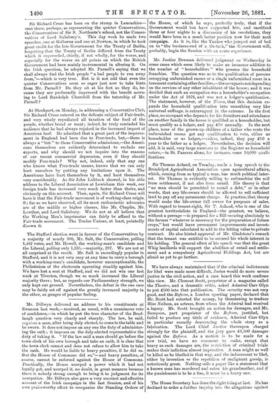Mr. Dillwyn delivered an address to his constituents at Swansea
last week,—received, as usual, with a unanimous vote of confidence,—in which he put the true character of the Brad- laugh question very clearly and sharply. The law, he said, requires a man, after being duly elected, to come to the table and be sworn. It does not impose on any one the duty of administer- ing the oath ; it imposes on the duly-elected representative the duty of taking it. " If the law said a man should go before the town clerk of his own borough and take an oath, it is clear that the town clerk cannot and does not refuse to allow him to take the oath. He would be liable to heavy penalties, if he did so. But the House of Commons did so,"—and heavy penalties, of course, cannot be enforced against the House of Commons. Practically, the House usurped a power which it had not legally got, and usurped it, no doubt, in great measure because there is nobody strong enough to bring it to judgment for its usurpation. Mr. Dillwyn also gave a very succinct and effective account of the Irish campaign in the last Session, and of his own praiseworthy effort to reorganise the Standing Orders of the House, of which he says, perfectly truly, that if the Government would but have supported him, and sacrificed three or four nights to a discussion of his resolutions, they would have been in a much better position now for their next campaign. As it is, like the Yankee who jumped out of bed on to "the business-end of a tin-tack," the Government will, probably, begin the Session with an acute experience.


































 Previous page
Previous page